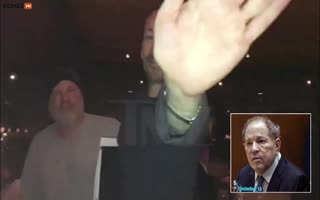 00:42
Communist Professor At Emeroy At Pro-Hamas Rally Learns She Has No Special Privileges With The Cops
00:42
Communist Professor At Emeroy At Pro-Hamas Rally Learns She Has No Special Privileges With The Cops
Georgians Get Slammed with Protest Hoses in Freezing Tempts Whilst Protesting New Law That Penalizes Foreign Earnings
 01:28
Columbia University Student Calls For The Death Of 'White Supremacists And Zionists'
01:28
Columbia University Student Calls For The Death Of 'White Supremacists And Zionists'
 00:42
Communist Professor At Emeroy At Pro-Hamas Rally Learns She Has No Special Privileges With The Cops
00:42
Communist Professor At Emeroy At Pro-Hamas Rally Learns She Has No Special Privileges With The Cops
 00:57
Dude Almost Gets Sex Trafficked In Vietnam
00:57
Dude Almost Gets Sex Trafficked In Vietnam
 01:02
Nashville Passes Legislation Criminalizing Parents Who Help Transition Their Minor Children
01:02
Nashville Passes Legislation Criminalizing Parents Who Help Transition Their Minor Children
 00:13
Wheelies Gone Bad Can Be A Real Pain In The Ass
00:13
Wheelies Gone Bad Can Be A Real Pain In The Ass
 00:46
High School Athletics Director Arrested After Making An AI-Generated Deepfake Racist Rant By The Principle As An Act Of Revenge
00:46
High School Athletics Director Arrested After Making An AI-Generated Deepfake Racist Rant By The Principle As An Act Of Revenge
Protests have erupted in Tbilisi, the capital city of Georgia, after the government passed a controversial "foreign agent" law, which critics argue could be used to suppress free speech and civil society. Under the new legislation, non-governmental organizations (NGOs) that receive funding from abroad and engage in political activities will be required to register as "foreign agents," a term widely associated with espionage. The law has been condemned by international human rights groups and the United States, which has urged the Georgian government to reconsider its implementation. Protesters have taken to the streets, calling for the law to be repealed and for greater transparency and accountability in government. Some have also expressed concern about the broader direction of Georgian politics, including alleged corruption and a lack of progress on democratic reforms. The situation remains tense, with clashes reported between protesters and police, and the outcome of the protests uncertain. The events in Tbilisi highlight the ongoing struggle for democracy and freedom of expression in many countries around the world.




